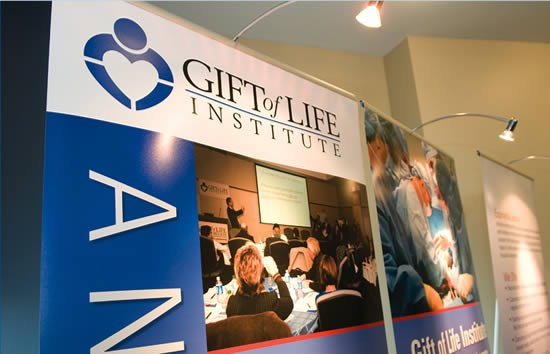As donation professionals, we can help our families to identify and recognize the losses they have experienced during the past year, and we can validate them. We can also help donor families “name and claim” the grief that goes along with these losses. Giving voice and validation to what they are experiencing can be a way to enfranchise their grief and make it real. We can encourage families to find meaning in the losses; hopefully we are all able to connect with friends and family more this season than last, but remember how much our donor families may be carrying, and let them know we care.
 Acknowledge the loss
Acknowledge the loss
This may seem obvious but it’s okay to acknowledge that the holidays will be difficult without the person who has died. It’s likely that friends and family members will avoid talk of the holidays or mentioning the loss. And for the grieving individual, that avoidance can feel hurtful and isolating. Say something. Normalize their experience. “This time of year could be really hard without having your husband around.” That simple sentence will open the door to a deeper conversation about the person who died and his or her family.
Ask about past holidays
During the authorization conversation, you’re likely going to ask the family to tell you about the potential donor. Ask them about how they celebrated the holidays last year. Or ask them if the potential donor had a special tradition or favorite holiday ritual. This will allow you to learn more about the family and their loved one and it will allow the family to reminisce and recollect, both important parts of mourning.
Support their plans
Some grieving families will share with you that that they plan to skip the holidays completely this year. Others will decide they need to recreate their loved one’s special holiday routines or traditions. Both are normal and totally acceptable. When a grieving family member shares their ideas for what they will do for the holidays, don’t pass judgment. Just let them talk.
Don’t wish them a “Happy Holiday”
Again, this might seem obvious but phrases like “Happy Holidays” come out of our mouths so easily during December. Be especially aware not to finish a conversation with this. Instead, you can wish them peace and comfort. You can tell them you hope they will be surrounded by people who love and care for them. Don’t just convey this with words. Pay special attention to your non-verbal communication. Eye contact, tone of voice and nodding your head all suggest your genuine holiday wish for them.
Give them a gift
Of course we don’t mean a gift you buy at a store. We mean the gifts of compassion, the opportunity of donation and a listening ear. We are often the one person who walks into their room of sadness and crisis while everyone is walking out. Bearing witness to their pain, allowing them to express their feelings and just being present is a gift.
A poem by Nancy Myerholtz hangs in our office so we never forget that we can give donor families “The Gift of Someone Who Listens.” Following is an excerpt:
It wasn’t the person with answers
Who told us of ways to deal,
It wasn’t the one who talked and talked
That helped us start to heal.
We need to always remember
That more than words we speak,
It’s the gift of someone who listens
That most of us desperately seek.
So as we get closer to the end of the year, don’t forget that for the families we interact with, this will be a December like none other. They may not remember your name but they will remember how you made them feel during the donation process. This is true all year round but around the holidays, everything is magnified. And for those of you who are working on the holidays instead of spending it with your family, thank you for your commitment to providing our donor families with the support and compassion they deserve.
Lara Moretti, LSW, FT is the Director of Family Support Services at Gift of Life Donor Program in Philadelphia, PA; Emily Jauregui, LPC, CT is a Family Support Counselor at Gift of Life Donor Program in Philadelphia, PA

